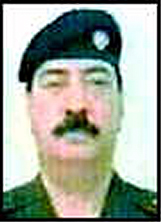Mohammed Younis al-Ahmed
| Younis al-Ahmed | |
|---|---|
| محمد يونس الأحمد | |
 |
|
| Regional Secretary of the Regional Command of the Iraqi Regional Branch | |
|
Assumed office 3 January 2007 |
|
| Preceded by | Saddam Hussein |
| Personal details | |
| Born | 1949 (age 67–68) al-Mowall, Mosul, Iraq |
| Political party | Iraqi Regional Branch of the Arab Socialist Ba'ath Party |
| Religion | Sunni Islam |
| Military service | |
| Nickname(s) | Khadr al-Sabahi |
| Allegiance |
|
| Service/branch | Iraqi Army |
| Unit | Political Guidance Directorate |
Mohammed Younis al-Ahmed al-Muwali (Arabic: محمد يونس الأحمد) aka Khadr al-Sabahi is a former senior member of the Ba'ath Party in Iraq with a Million Dollar Bounty on his head as one of Iraq's most wanted men accused of funding and leading resistance operations. He is the leader of al-Awda; an underground Ba'athist movement in Iraq.
Ahmed was born in 1949 in al-Mowall in the governorate of Mosul, Iraq.
Before the Invasion of Iraq Ahmed served in the Political Guidance Directorate of the Iraqi Army, the department tasked with ensuring Ba'athist control of the military. He later became a senior member of the Ba'ath Party's Military Bureau.
A former aide to former President of Iraq and leader Saddam Hussein and a regional Baath Party organiser who it appears was trained in Moscow, following the 2003 War in Iraq he has emerged as one of the leading figures among the Iraqi Insurgency and a major rival to Izzat Ibrahim ad-Douri.
Largely based in Syria since the war he is believed to have access to substantial funds and that he has been disbursing funds and directing fighting of Sunni Insurgents inside Iraq.
On 23 August 2009 the Iraqi government aired a taped conversation linking two members of the Syria-based Iraqi Ba'athist movement, Sattam Farhan and Mohammed Younis al-Ahmed, with the 19 August 2009 Baghdad bombings which claimed more than 100 lives. The Syrian foreign ministry denied Syrian involvement in the attack. On 25 August Iraq summoned its ambassador to return from Syria, the Syrian government issued a similar order to its ambassador within hours in retaliation. Responsibility for the attack was later claimed by the Islamic State of Iraq, an Al-Qaeda umbrella group.
...
Wikipedia
